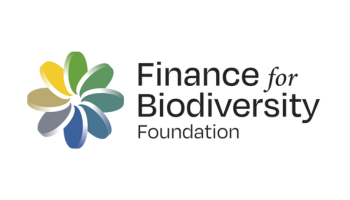
Finance for Biodiversity
INTERVIEW
Shareholders for Change
Empowering Financial Institutions to commit to halt and reverse Biodiversity loss: The Role of the Finance for Biodiversity Foundation
The Finance for Biodiversity (FfB) Foundation is a non-profit organisation founded in March 2021. It is dedicated to support a call to action and collaboration between financial institutions via working groups and programmes, serving as a connecting body for contributing signatories of the FfB Pledge and partner organisations.
At the moment, 170 financial institutions, representing 26 countries with over €22 trillion in assets, have signed the FfB Pledge. Financial institutions can join the FfB Foundation by signing the Pledge and thus becoming signatories and/or members, depending on their degree of involvement in FfB´s mission.
The current 75 financial institutions members of the FfB Foundation are sharing knowledge on biodiversity in the different working groups and setting up collaborative actions in diverse subgroups and corporate engagement initiatives like Nature Action 100.
The risks of Biodiversity loss for financial institutions
Many reports, like the ones of the Network for Greening the Financial System (NGFS) and the Dutch Central Bank show that the financial sector is exposed to risks as a result of biodiversity loss. Biodiversity loss is a source of financial risks and threatens the ecosystem services, such as wood, animal pollination and soil fertility, on which economic activities depend. As a result, banks, insurers, asset managers and owners that finance these economic activities face risks.
The role of banks, insurers, asset managers and investors will become increasingly relevant in the coming years due to several pressures such as strengthening liability regimes, intensifying scrutiny of companies’ supply chain practices and shifting consumer preferences which are making biodiversity increasingly relevant for businesses.
The financial sector can play an important role to mitigate these risks through knowledge sharing and collaborative activities with its members.
The Finance for Biodiversity Pledge & Working Groups
Financial institutions who are signatories to the FfB Pledge, recognise the role they must play in reversing biodiversity loss by 2030 and are committed to ambitious action through their investments and finance activities.
Pledge signatories call on global leaders to take effective measures to halt and reverse nature loss and commit in protecting and restoring biodiversity through their finance activities and investments by 1) collaborating and sharing knowledge, 2) engaging with companies, 3) assessing impact, 4) setting targets and 5) reporting publicly on the previous commitments.
Pledge signatories that committed before 2024, report publicly in 2025 (with 2024 data). Pledge signatories that committed in 2024, report publicly in 2027 (with 2026 data).
Each one of the five commitments are connected to a working group and convenes between 20 –50 member financial institutions. Within each working group, members can learn more about biodiversity, share knowledge and collaborate on a range of initiatives. These include:
1. Engagement with Companies: This working group shares developments, experiences and collaboration on biodiversity-related ESG engagement with companies. For guidance on biodiversity engagement, please see our Guide on engagement with companies.
2. Impact Assessment: Members of this group share case studies, developments on data and tools and best practices and lessons learned regarding different biodiversity measurement approaches for financial institutions such as our Guide on biodiversity measurement approaches and the Guide on biodiversity integration by financial institutions.
3. Public Policy Advocacy: With a focus on advocating for an ambitious and effective outcome of the Convention on Biological Diversity (CBD) COP16 in 2024, this working group seeks to follow developments within global and regional biodiversity public policies. It will advocate for effective regulation and policies to support an enabling environment for financial institutions and organises collaborative engagements with policy makers on an ambitious implementation of the GBF by governments. More information on the implementation of the Global Biodiversity Framework for investors, please see Stepping up on Biodiversity: What the Kunming‑Montreal Global Biodiversity Framework means for responsible investors.
Information on the collaborative recommendations for governments from financial institutions can be read in the publication Aligning financial flows with the Global Biodiversity Framework: Translating ambition into implementation.
4. Target Setting: In this working group, members are sharing experiences, new developments and exploring science-driven global goals, targets, and frameworks. The working group launched Target Setting Framework on Nature for Asset Owners and Asset Managers in 2023 and will update it in 2024.
5. Positive Impact: This working group aims to identify frameworks on nature positive impact investments and promote solutions to mobilise private financial flows towards the conservation, restoration and sustainable use of nature.
Future directions and Impact
Looking ahead, the FfB Foundation is committed to expanding its reach and impact in the financial sector. By fostering collaboration, driving innovation, and advocating for policy change, we aim to establish a growing movement of financial institutions who join the mission to reverse nature loss by 2030. Supporting financial institutions in implementing the Montreal-Kunming Agreement (adopted at CBD COP15) is a core step to the protection and restoration of biodiversity and ecosystems. We will continue to do so with key partner organisations.
